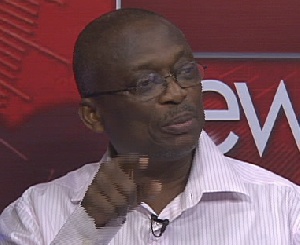- Home - News
- TWI News | TV
- Polls
- Year In Review
- News Archive
- Crime & Punishment
- Politics
- Regional
- Editorial
- Health
- Ghanaians Abroad
- Tabloid
- Africa
- Religion
- Election 2020
- Coronavirus
- News Videos | TV
- Photo Archives
- News Headlines
- Press Release
General News of Monday, 16 May 2016
Source: kasapafmonline.com
Show proof of decision to invest $250 at UBA – Baako
Editor-in-Chief of the New Crusading Guide Newspaper, Kweku Baako Jnr has challenged the Ministry of Finance and the Board of the Ghana Infrastructure and Investment Fund (GIIF) to show proof by documentation that a decision was taken to invest a whopping $250m of the 2014 Eurobond proceeds to a private bank.
According to him, there must be a convincing proof that serious thinking went into that exercise which has become a subject of controversy.
Vice-Presidential Candidate of the New Patriotic Party (NPP), Dr. Mahamudu Bawumia while addressing students of the Accra Polytechnic on May 5, asserted government’s transfer of some $250 million of the 2014 Eurobond proceeds to a private bank is an example of the reckless management of Ghana’s debts.
He claimed the funds “ostensibly transferred to UBA on behalf of the Ghana Infrastructure Investment Fund (GIIF)” amounts to a breach of the Bank of Ghana Act 2002 (Act 612).
However, Finance Minister, Seth Terkper denied government has breached the law by transferring the money to a commercial bank.
He said the decision has rather earned the country a profit of $23 million. This would not have been possible had the money been left in government’s account, he added.
He also said the Ghana Infrastructure Investment Fund (GIIF) is a statutory fund as the GETfund, NHIA and the DACF in the country.
But Dr. Bawumia said the ministers comparison of the GIIF to the GETfund and NHIA is “basically comparing apples with oranges”.
He said the minister should rather compare the GIIF to the Petroleum Fund “which is also kept at the Bank of Ghana under the Petroleum revenue Management Act”.
He expressed worry about government’s claim that the money was lying idle in the account.
“The government is claiming that the funds were ‘idle’ Really?” he asked.
“What does that mean? Why do you borrow funds and pay interest on it if you do not have use for them at the moment? It is clear that the GIIF does not have a portfolio of projects ready to invest in and it is weird to allocate a whopping sum of $250 million to them at this time. Is the Minister aware that the country owes N-Gas some $100 million?”
But speaking on Joy FM’s News Analysis show News File Saturday, Kweku Baako Jnr wondered what policy decision that drove the choice to remove the money from Bank of Ghana.
“Is Bank of Ghana incapable or disabled by law from using the money that was within its domain to do something that would have accrued interest?…does the Bank of Ghana Act disable the Central Bank from applying that amount of money while we were waiting for the Investment Fund to take off properly. A decision taken that this huge amount of money goes to one particular bank for the bank and the Ghana Infrastructure Investment Bank to do some transaction with it…where is the record. I want to see the documentation; I want to be convinced that serious thinking went into this exercise.
“And while this thinking was proceeding it was decided that Bank of Ghana was not the best platform to use to make interest. Because we’ve been told now that we’ve gain GHC 23m so the money would have been lying idle …is it true that the money, if the policy and decision makers did not want the money to lie idle, could bank of Ghana not be triggered to ensure that, that money lying idle there would not lie idle but would also gain interest? Is there a law that stopping the Bank of Ghana from doing anything that would have helped to ensure that that $ 250m could have been applied in the interest of the public and the GIIF?
“There must be a certain reason that would be compelling, persuasive and convincing that if it was Bank of Ghana that ought to do it because the law does not disable it, we may not be gaining, but as a country we’ll gain by using a singular bank called UBA.”











